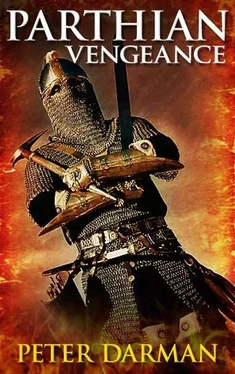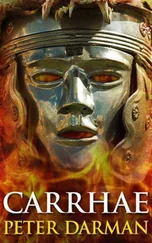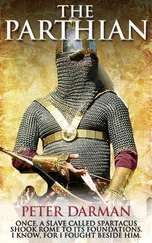Peter Darman - Parthian Vengeance
Здесь есть возможность читать онлайн «Peter Darman - Parthian Vengeance» весь текст электронной книги совершенно бесплатно (целиком полную версию без сокращений). В некоторых случаях можно слушать аудио, скачать через торрент в формате fb2 и присутствует краткое содержание. Год выпуска: 2012, Жанр: Исторические приключения, на английском языке. Описание произведения, (предисловие) а так же отзывы посетителей доступны на портале библиотеки ЛибКат.
- Название:Parthian Vengeance
- Автор:
- Жанр:
- Год:2012
- ISBN:нет данных
- Рейтинг книги:5 / 5. Голосов: 1
-
Избранное:Добавить в избранное
- Отзывы:
-
Ваша оценка:
- 100
- 1
- 2
- 3
- 4
- 5
Parthian Vengeance: краткое содержание, описание и аннотация
Предлагаем к чтению аннотацию, описание, краткое содержание или предисловие (зависит от того, что написал сам автор книги «Parthian Vengeance»). Если вы не нашли необходимую информацию о книге — напишите в комментариях, мы постараемся отыскать её.
Parthian Vengeance — читать онлайн бесплатно полную книгу (весь текст) целиком
Ниже представлен текст книги, разбитый по страницам. Система сохранения места последней прочитанной страницы, позволяет с удобством читать онлайн бесплатно книгу «Parthian Vengeance», без необходимости каждый раз заново искать на чём Вы остановились. Поставьте закладку, и сможете в любой момент перейти на страницу, на которой закончили чтение.
Интервал:
Закладка:
I thanked Rome’s gods that they had revealed to me the mysteries of the Roman military machine, its organisation and encampment procedures. For if Dura’s army had been run along Parthian lines then we would surely have been carrion for the crows by the morning. But at least we had a ditch, rampart and palisade surrounding us. Those defences gave me time to think of a plan for the morrow. I also breathed a huge sigh of relief that it was not the Parthian way to fight at night; otherwise we would be fending off attacks during the hours of darkness.
When word had reached Marcus of what was happening, after they had arrived back in camp he had ordered the squires to man the rampart with their bows in case the enemy tried to storm the camp. The squires had taken no part in the battle and they were thus fresh and rested, and eager to fight. They may have been boys, mostly between fourteen and sixteen years of age, but they were well versed in using a Parthian bow. To curb their youthful enthusiasm Marcus gave each boy a full quiver and said he would increase his fatigue duties if he wasted any arrows.
As well as the squires and the fighting men there were farriers, veterinaries, blacksmiths, the riders of the camels of the ammunition train and the wagons, Marcus’ men and Alcaeus’ medical personnel in camp — over three thousand men.
Domitus organised parties to reinforce the rampart defences as the enemy slowly surrounded the camp. Despite my general’s fears that they would launch an immediate attack from all sides they actually showed no signs that they would assault us. They were content to deploy on all four sides of the camp and then stand in their ranks. The camp’s main entrance was on the western side and that was where Narses placed his foot, thousands of spearmen dressed in yellow tunics and blue leggings. They carried long spears topped by leaf-shaped points and wore helmets on their heads. Their large rectangular shields were made of wicker covered with leather painted yellow. They also carried what looked like long daggers in scabbards fixed to their belts. They wore no body armour. In the centre of the line stood Narses’ élite foot soldiers — his palace guard, or at least that is what I assumed they were. They wore bronze helmets with large cheekguards to protect the sides of their faces and had leather cuirasses over their torsos. Their tunics were yellow like the other foot soldiers and they too were armed with spears that had leaf-shaped blades. However, their shields were round and faced with bronze after the Greek fashion, with the symbol of the bird-god painted on each one. There were around two thousands of them.
To the north of our camp Narses deployed his horse archers, thousands of men in helmets, yellow shirts and red leggings. Some of them wore armour on their bodies. On the south side of the camp were yet more archers similarly attired, a great mass of men and horseflesh intended to awe us. Last but by no means least to the east of the camp came Narses himself, accompanied by around five thousand or more armoured horsemen.
I stood on the rampart with Orodes, Domitus and Surena as they rode towards our camp and then halted around four hundred paces away; a horde of heavy cavalry, each man holding a kontus . I estimated that we were surrounded by at least thirty thousand enemy soldiers.
Narses, the King of Persis and Sakastan, had always cut a dashing figure, adorning every inch of his powerful frame with expensive clothes and armour. Today was no different. Mounted as ever on his magnificent black stallion, whose immaculately groomed coat shone in the late afternoon sun, he and his horse wore no scale armour. Instead he wore a cuirass made up of overlapping rows of silver segments and on his large head he wore a helmet inlaid with gold. Its cheekguards were also inlaid with gold and silver and from its crown streamed a long black horsehair plume. Next to him, also seated on a black stallion, was King of Kings Mithridates. I spat over the palisade stakes in his direction, hoping he would see my insult. Perhaps he would be enraged and launch an assault. I gripped the hilt of my spatha .
‘You are wasting your spit,’ growled Domitus. ‘He’s got us where he wants us. The last thing he’ll do is make any rash moves.’
‘Give me some men, lord,’ said Surena, who appeared remarkably fresh despite his participation in the battle. ‘I can launch an attack against them. They are very close.’
Domitus looked at him and shook his head, prompting a scowl from Surena. Domitus had always regarded Surena as volatile and reckless. For his part Surena believed Domitus to be far too cautious.
‘No, Surena,’ I replied. ‘For the moment we conserve our strength.’
Domitus looked up at the sun descending on the western horizon.
‘They won’t attack today.’
‘Knowing my stepbrother,’ added Orodes, ‘he would prefer to starve us into submission rather than offer battle.’
Narses was obviously bored with watching us as he wheeled his horse away and rode back to the camp that was being established to the south of our position. His many cataphracts and Mithridates followed the lord high general of the Parthian Empire. To the east where the earlier battle had taken place, smoke was billowing into the sky. The enemy was cremating the dead on great pyres rather than burying them. Perhaps Orodes was right — the enemy intended to starve us into submission rather than assault our camp. No general would want piles of bodies and rotting carcasses near his army. Already the flies would be swarming over dead flesh, and where there was dead flesh there would soon be plague and sickness. At least there was still a slight northerly wind that carried the stench of burning flesh to the south rather than over our camp. To the west the sky was a mass of blues and purples streaked with orange and yellow. It was a beautiful spring evening. I hoped it would not be our last.
I turned to the others. ‘Get something to eat. Council of war in an hour.’
With due reverence the griffin and lion standards were returned to their tents and guards placed around them. Officers reported to Domitus and Orodes in my command tent and clerks recorded the number of dead and wounded. When we returned to Dura, if we returned to Dura, those killed who had families would be informed of the pensions they were entitled to. Any children of the deceased would be entitled to free education and any males could be enrolled in the Sons of the Citadel scheme should they be suitable. When I had first come to Dura Domitus had insisted that his legionaries should be forbidden to marry, as was the rule in the Roman army. However, after a while many legionaries had formed relationships and had given their women part of their wages so they could rent rooms in the city. They were de facto man and wife. And when men among the cavalry began to enter into marriages it was clearly impractical and unfair to insist that the legionaries should be treated differently. Domitus grumbled but acquiesced. I suggested that he too should take a wife but he had scowled and grumbled some more so I let the matter rest.
Before the council meeting I walked round the camp and talked with as many men as possible. Despite being outnumbered and surrounded they were in remarkably good spirits, but then victory has a habit of intoxicating the soul and diminishing the size of the enemy. Walking back to my tent I threaded my way through the neat rows of eight-man tents in which the legionaries and horsemen slept. I came across one of the Companions, a Thracian named Drenis who had been a gladiator in Capua, in the same school as Spartacus. I had absolutely no idea how old he was but judging by the scars and lines on his face he must have been a veteran of a hundred battles! His arms and legs were similarly adorned with scars and marks, further mementoes of his time in the arena and on the battlefield. He had started out as a slave before becoming a gladiator, then served in the ranks of the slave army in Italy before becoming a centurion in Dura’s army. He now commanded two cohorts, the equivalent of a Roman tribune, though he would never countenance accepting a title used by his enemies. He was standing next to a brazier holding forth to a group of his centurions sitting on stools round it. They all stood up when they saw me. I indicated to them to regain their seats.
Читать дальшеИнтервал:
Закладка:
Похожие книги на «Parthian Vengeance»
Представляем Вашему вниманию похожие книги на «Parthian Vengeance» списком для выбора. Мы отобрали схожую по названию и смыслу литературу в надежде предоставить читателям больше вариантов отыскать новые, интересные, ещё непрочитанные произведения.
Обсуждение, отзывы о книге «Parthian Vengeance» и просто собственные мнения читателей. Оставьте ваши комментарии, напишите, что Вы думаете о произведении, его смысле или главных героях. Укажите что конкретно понравилось, а что нет, и почему Вы так считаете.












